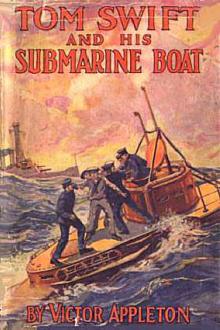Struggling Upward, or Luke Larkin's Luck, Jr. Horatio Alger [spiritual books to read txt] 📗

- Author: Jr. Horatio Alger
Book online «Struggling Upward, or Luke Larkin's Luck, Jr. Horatio Alger [spiritual books to read txt] 📗». Author Jr. Horatio Alger
"Father," he said, "will you do me a favor?"
"What is it, Randolph?"
"Let me have ten dollars."
His father frowned.
"What do you want with ten dollars?" he asked.
"I don't like to go round without money in my pocket. It doesn't look well for the son of a rich man."
"Who told you I was a rich man?" said his father testily.
"Why, you are, aren't you? Everybody in the village says so."
"I may, or may not, be rich, but I don't care to encourage my son in extravagant habits. You say you have no money. Don't you have your regular allowance?"
"It is only two dollars a week."
"Only two dollars a week!" repeated the father angrily. "Let me tell you, young man, that when I was of your age I didn't have twenty-five cents a week."
"That was long ago. People lived differently from what they do now."
"How did they?"
"They didn't live in any style."
"They didn't spend money foolishly, as they do now. I don't see for my part what you can do with even two dollars a week."
"Oh, it melts away, one way or another. I am your only son, and people expect me to spend money. It is expected of one in my position."
"So you can. I consider two dollars a week very liberal."
"You'd understand better if you were a young fellow like me how hard it is to get along on that."
"I don't want to understand," returned his father stoutly. "One thing I understand, and that is, that the boys of the present day are foolishly extravagant. Think of Luke Larkin! Do you think he spends two dollars even in a month?"
"I hope you don't mean to compare me with a working boy like Luke?" Randolph said scornfully.
"I am not sure but Luke would suit me better than you in some respects."
"You are speaking of Luke," said Randolph, with a lucky thought. "Well, even he, working boy as he is, has a better watch than I, who am the son of the president of the Groveton Bank."
"Do you want the ten dollars to buy a better watch?" asked Prince Duncan.
"Yes," answered Randolph, ready to seize on any pretext for the sake of getting the money.
"Then wait till I go to New York again, and I will look at some watches. I won't make any promise, but I may buy you one. I don't care about Luke outshining you."
This by no means answered Randolph's purpose.
"Won't you let me go up to the city myself, father?" he asked.
"No, I prefer to rely upon my own judgment in a purchase of that kind."
It had occurred to Randolph that he would go to the city, and pretend on his return that he had bought a watch but had his pocket picked. Of course, his father would give him more than ten dollars for the purpose, and he could privately pay it over to Tony Denton.
But this scheme did not work, and he made up his mind at last that he would have to tell Tony he must wait.
He did so. Tony Denton, who fully expected this, and, for reasons of his own, did not regret it, said very little to Randolph, but decided to go round and see Prince Duncan himself. It would give him a chance to introduce the other and more important matter.
It was about this time that Linton's birthday-party took place. Randolph knew, of course, that he would meet Luke, but he no longer had the satisfaction of deriding his shabby dress. Our hero wore his best suit, and showed as much ease and self-possession as Randolph himself.
"What airs that boy Luke puts on!" ejaculated Randolph, in disgust. "I believe he thinks he is my equal."
In this Randolph was correct. Luke certainly did consider himself the social equal of the haughty Randolph, and the consciousness of being well dressed made him feel at greater ease than at Florence Grant's party. He had taken additional lessons in dancing from his friend Linton, and, being quick to learn, showed no awkwardness on the floor. Linton's parents, by their kind cordiality, contributed largely to the pleasure of their son's guests, who at the end of the evening unanimously voted the party a success.
CHAPTER XXIV — A COMMISSION FOR LUKE
Upon his return to the city, John Armstrong lost no time in sending for Roland Reed. The latter, though rather surprised at the summons, answered it promptly. When he entered the office of the old merchant he found him sitting at his desk.
"Mr. Armstrong?" he said inquiringly.
"That's my name. You, I take it, are Roland Reed."
"Yes."
"No doubt you wonder why I sent for you," said Mr. Armstrong.
"Is it about the robbery of the Groveton Bank?"
"You have guessed it. You know, I suppose, that I am the owner of the missing box of bonds?"
"So I was told. Have you obtained any clue?"





Comments (0)